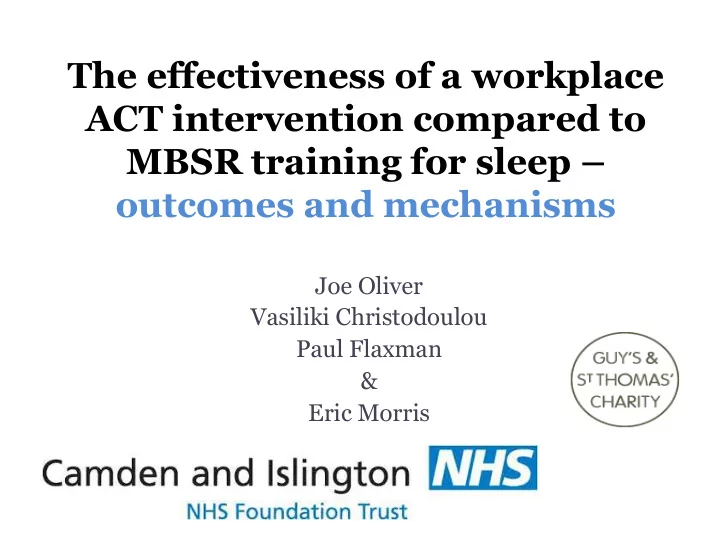

The effectiveness of a workplace ACT intervention compared to MBSR training for sleep – outcomes and mechanisms Joe Oliver Vasiliki Christodoulou Paul Flaxman & Eric Morris
Reading RFT The morning after In bed actually Purple the Follies trying to sleep Book
Problems with workplace sleepiness • 2008 'sleep in America' poll - 65% of people experienced sleep problems a few nights per week. • Amount of sleep workers get has been declining steadily over past 30 years as working hours have increased (declined around 7% between 1999 and 2009 alone) • Estimated economic burden of sleepiness (figures from US): $16 billon in medical expense; $53 to $69 in vehicle accidents, $18 - to $24 billion in work-related accidents (Source: Mullins et al. 2014; Welsh et al. 2014)
A Range of Consequences Linked to Poor Sleep • Common mental health problems; unethical work behaviour (due to reduction in self-regulatory resources); poor mood; incivility in workplace; various physical health problems (obesity, hypertension, CVD), increased absence rates, reduced work performance
ACT Vs Mindfulness-Based Training
Research Questions • Comparing ACT training to Mindfulness-based training (low-dose) on sleep outcomes for working individuals. • Do the interventions operate via the expected mechanisms of change? -ACT (values-based action) -MBSR (mindfulness)
Participants • Staff from an NHS mental health trust. • 26% nursing, 15% psychology, 11% administrative, 8% allied health & other professions. • N= 200; ACT(n)=66; Mindfulness(n)=58; Waiting list(n)=75 • Dropout by T5: T5 waitlist: 22.6% T5 Act: 25.7% T5 Mindfulness training:29.3% • 77% female • Mean age =42 ( sd =10.4) • 58.6%: Above clinical level of distress at T1.
Protocol • 4 sessions (3, 2-hour sessions in consequent weeks; one session after 6 weeks). • Randomised controlled trial (ACT, Mindfulness- based training, Waiting list). • Completion of measures at pre (T1), post 4 weeks (T2), post 10 weeks (T3), post 16 weeks (T4) , follow-up 22 weeks (T5). • Groups: 5-12 participants
ACT worksite protocol
MBSR worksite protocol
Questionnaires • General Health Questionnaire-12 • Perceived Stress Scale • Work Limitations Questionnaire • Sleep Scale (from physical health questionnaire) • Activity and Circumstances Change Questionnaire • Acceptance & Action Questionnaire-7 • Five Factor Mindfulness Questionnaire • Behavioural Activation Scale • Valuing Questionnaire
Questionnaires • Sleep Scale (from physical health questionnaire) • “How often have you had difficulty getting to sleep?” • “How often have you woken up during the night?” • Activity and Circumstances Change Questionnaire (4 item) • “Please rate the extent to which you have adopted some significant positive new goal or activity over the last 4 weeks” • Five Factor Mindfulness Questionnaire • Act with Awareness • Non-judgement • Non-reactivity
Analysis and Results • Latent growth curve modelling • Rate of change across 5 time points in outcome • Rate of change of mediators • Does rate of change of goal directed behaviour and mindfulness mediate the effect of the interventions on sleep?
t1 t2 t3 t4 t5 t1 FFMQ FFMQ Intercept ¡ Intercept ¡ Slope ¡ Sleep ¡ t2 ACT Mindfulness t3 training Goals & Goals & activities activities Slope ¡ Sleep ¡ Intercept ¡ Slope ¡ ¡ t4 t1 t2 t3 t4 t5 t5 χ 2 = 237.78, df = 127, p < .0001, CFI = .92, TLI = .92, RMSEA = .066 (.053, .079)
Main ¡Results ¡
Main ¡Effects ¡ Mindfulness ¡ . 27 ¡ -.60 ¡ . 43 ACT ¡ -.49 Sleep ¡ Problems ¡ -.54 ¡ ¡ Mindfulness training . 47 -.70 . 40 ¡ Goals ¡& ¡ Activities ¡ ¡ ¡
Indirect ¡Effects ¡ Mindfulness ¡ ¡ ¡ ACT ¡ Sleep ¡ Problems ¡ ¡ ¡ Mindfulness training ¡ Goals ¡& ¡ Activities ¡ ¡ ¡
Indirect ¡Effects ¡-‑ ¡ACT ¡ Mindfulness ¡ ¡ ¡ ACT ¡ Sleep ¡ Problems ¡ ¡ ¡ Mindfulness training -.33 ¡ Goals ¡& ¡ Activities ¡ ¡ ¡
Indirect ¡Effects ¡-‑ ¡ Mindfulness ¡ Mindfulness ¡ ¡ ¡ ACT ¡ Sleep ¡ Problems ¡ ¡ ¡ Mindfulness training -.28 ¡ Goals ¡& ¡ Activities ¡ ¡ ¡
Summary • Both ACT training & Mindfulness-based training appear to be suitable and effective for poor sleep • Programs can be brief. • ACT impacts more on behavioural changes • MBSR impacts more on mindfulness • Change in both interventions appears to be mediated through increases in goal directed behaviour
Summary (2) • Behavioural change important in sleep outcomes • Change to routines • Increased self care • More values guided behaviour • Evidence that impact is not via “relaxation” processes • Next steps to look more closely at rates of change of variables
Thank you! Any questions?
Recommend
More recommend